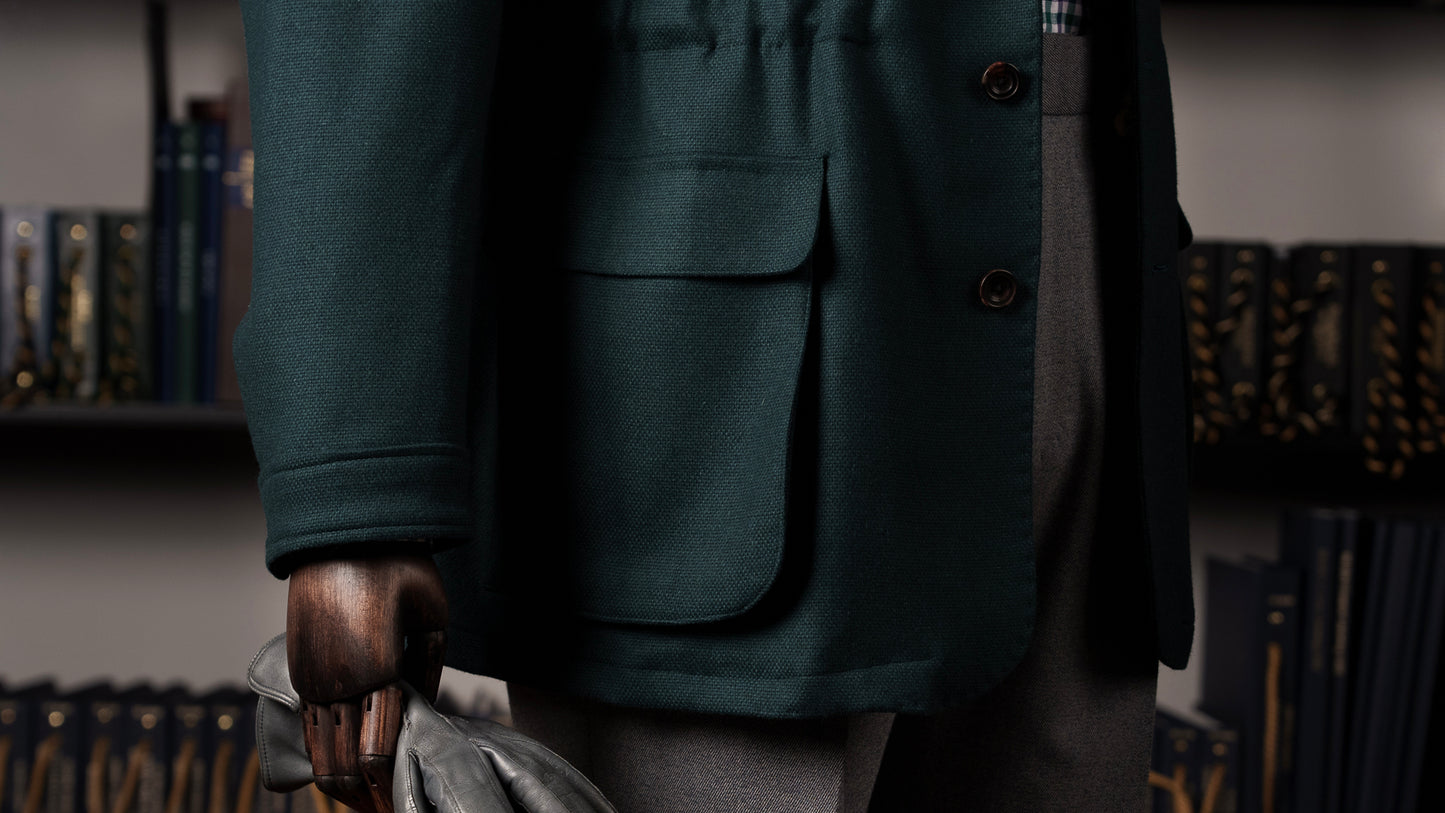
In terms of the features that shape the appearance of a suit or sport jacket, pockets are secondary only to fabric and lapel shape. But while the difference between a notched or peak lapel is exclusively aesthetic, the decision to add a ticket pocket or go flapped vs patch is also a matter of functionality.
With so many options, choosing your pocket style can be a daunting task when commissioning bespoke clothing. So, in the interest of minimising any potential pocket-related anxiety, we’ve drawn up an overview of the three most popular pocket styles and their variants.

FLAP POCKETS
The flapped pocket — where a pocket is cut into the interior of the garment and covered by a simple flap — is by far the most common pocket for both suits and jackets.
Straight, flapped pockets are often seen as the default setting for a jacket, also being the template for most ready-to-wear garments. Straight, flapped pockets are the best choice for when you’re not wishing to draw extra attention to a jacket, being well-suited for business wear.
Flapped pockets can also be set at an angle, being more commonly known as slanted pockets. The slant angle starts at a moderate 15% but can be increased to 20% – 25% for a more dramatic, right angle-like appearance.
Slanted pockets have an equestrian heritage, with their angled position making access easier when riding. Opting for slanted pockets can add further country appeal to a tweed jacket or make a worsted suit look sleeker by virtue of their dramatic angles.

Lastly, a smaller ticket pocket – so named because city businessmen taking the train to the country on weekends would use them to stash their train tickets – can be added above one of the flapped pockets. Typically set above the right pocket, they can be also set on the opposite side to accommodate the left handed. Either way, a ticket pocket can differentiate a jacket from a suit jacket or simply add extra interest to the latter.
When a jacket has slanted flapped pockets with a ticket pocket, it’s typically referred to as a Hacking Jacket. This pocket style has deep roots in English equestrian tradition, and instantly gives a suit or casual jacket a more rustic image.

JETTED POCKETS
Like flapped pockets, jetted pockets are cut into the interior of a jacket. However, they lack a flap, leaving only the appearance of a subtle slit on the body of the jacket. As with flapped pockets, jetted pockets can also be slanted and joined by a ticket pocket.
Being the most formal style of pocket, jetted pockets are a must on dinner jackets or smoking jackets. They’re less commonly seen on suit or casual jackets, in part because a well-made flapped pocket can be converted to a jetted pocket by simply tucking the flap into its interior. Cad & The Dandy’s flapped pockets are easily tucked, offering the versatility of a jetted look whenever the wearer should choose.

PATCH POCKETS
The last of the three major pocket styles, patch pockets are also the simplest. Rather than constructing a pocket inside the jacket, patch pockets are made by adding an extra patch of fabric to the jacket’s exterior, building the pocket on the outside.
In keeping with their simple construction – and larger visual presence — patch pockets are the most casual pocket style. This makes them a great choice for jackets and suits made from more casual fabrics, particularly lightweight linens and cottons.

Patch pockets can be left open at the top, or secured with a flap, creating what’s called a patch-flap pocket — a staple of American Ivy Style. Patch pockets can’t be slanted, but they can be curved with the top resembling the hull of a small boat – a classically Neapolitan approach.
The surface area of a patch pocket also allows for pleats. This could take the form of box pleats, created by layering additional fabric above the pocket, or an inverted pleat that creates a small opening on the pocket itself. Both add further interest to the patch pocket and can be topped by flaps.

The country cousin to the patch pocket is known as a cartridge or bellows pocket. Typically reserved for hunting jackets it is similar to the patch, being built up with extra fabric until it becomes a three-dimensional pouch capable of holding more items, which traditionally meant extra rounds of ammunition for your duck or pheasant hunt.
Whether you know your way around a rifle or not, a cartridge pocket can be a useful way to add more country appeal to a tweed jacket, or simply to carry a few tomatoes home from the local farmer’s market.
Cad & The Dandy bespoke jackets start at £1090, suits start at £1400. For more information, email savilerow@cadandthedandy.co.uk, call +44 (0)20 7434 4344 or book a consultation online.
Written for Cad & The Dandy by Eric Twardzik, a Boston-based writer focused on food, drink and classic men’s style. His work has featured on Vice.com, Robb Report, InsideHook and Ivy-Style.com, among many others.
MORE
‘You’ Season 4 – Costume Design
Cad & The Dandy Whisky
What is Pitti? – our Guide to Florence and the people that attend Pitti Uomo
